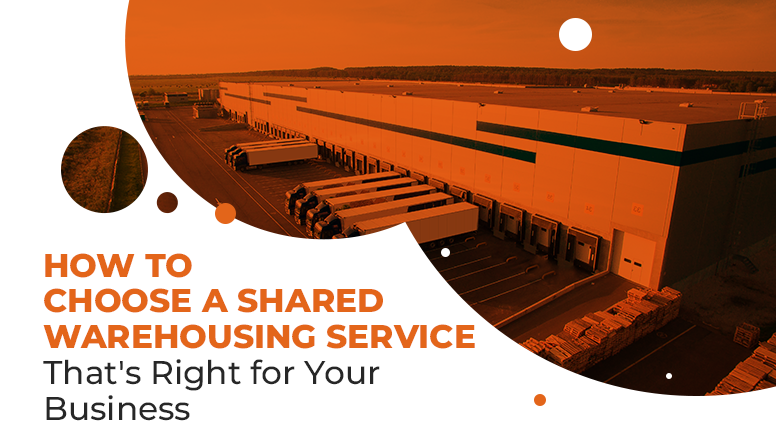Choosing the right warehouse determines the efficiency and pace of your business supply chain. In the current marketplace, warehousing has become essential to enabling a seamless supply network worldwide. The upsurge in eCommerce has not only driven massive changes in how consumers order their products but also changed the entrepreneurs’ views on the distribution and warehouse business. E-commerce growth has been responsible for the high demand for warehouse and industrial space. As the need for warehouses constantly increases, you must know which type of warehouse will serve your business the best. There are several options to consider while outsourcing warehouses from third-party providers. One core factor is to decide whether a dedicated warehouse or a shared warehouse is right for your business. Shared warehousing services are a more flexible solution with shorter contract terms with companies. In the simplest terms, a shared warehouse provides a campus-like environment where several companies can use the same distribution facilities and share resources at an affordable cost. In such market scenarios, company owners share labour, equipment expenditure, material handling of equipment, and IT infrastructure expenses.
While choosing shared warehouse services, it will be most convenient to consider a few factors. A shared warehouse facility allows you to share the cost equally across the companies. The multiple tenants in the building share the capital equipment, warehouse management system, racking, and technology simultaneously. It can be more advantageous if you can deliver the orders during the peak seasons. Ganesh Complex, one of the leading warehouse providers in Kolkata, provides you with the best shared industrial space solutions.
How To Choose a Shared Warehousing Service?
Warehouses are crucial to the supply chain network for domestic and global marketplaces. The main reason to opt for a warehouse is to stock your inventory for a specific time, maintaining proper safety and security. Why pay more for unnecessary services if you don’t need the entire warehouse space? In that context, it is more insightful to go for shared warehouse services and Industrial Logistic Parks.
Selecting a warehouse to store your products is quite overwhelming and confusing. Every business entrepreneur has specific warehousing needs that determine their warehouse choices. Specific features, including warehouse location and warehouse layout, are non-negotiable. The factors you must check before selecting a shared warehouse,
1. Access – Shared Warehousing Service
You must consider how easier it is to access the warehouse spaces. It will lessen the chances of order delay as the delivery happens from the warehouse only. While opting for a warehouse, you must ensure that the shared warehouse position meets the specific requirements. You must consider the factors while measuring the ease of access, such as access to public transportation, road conditions, nature of traffic, and highway interconnectivity, to make a smooth supply.
2. Customization
Shared warehouse space provides a limited customization facility to your company so you can operate the most complex business operations efficiently. It will be best to see whether your warehouse providers offer you the right customer solutions to meet your business needs.
3. Tenure
Shared warehouse spaces have short contractual tenure and more flexibility with lock-ins as service providers find replacements after a certain period. If you have a small or medium-sized business company, it will help you to take a business on a minor tenure. You can take a shared house position on rent at a short lease that fulfils your business requirements the rightmost way.
4. Operational Scopes
A shared warehouse implies a smaller workspace with operational diversities. In that case, you need to check whether the shared warehousing services can meet all your business requirements. Smaller space or lack of amenities must not serve as a hindrance on your path of business operations. You can check whether the other tenants are in the same industry, which can help you to manage your business more.
5. Charge Rate
Shared warehousing has a substantial impact on your business revenue. The less you pay behind your inventory, the more it will contribute to the revenue. A significant advantage of a shared warehousing solution is that your costs will remain consistent. You need to check whether the shared warehouse services come at an affordable rate.
6. Location
Location is a core consideration when selecting a warehouse. You must ensure that the warehouse lies close to your customer hub to ensure timely and budget-friendly deliveries. Before choosing a shared warehouse, you must check the transportation costs from the industrial space to the most common final destinations. Selecting a shared warehouse in the prime location will help you to align with the customer expectations as you can deliver the orders within days or even hours.
7. Experience
You need to check the experience of the shared warehouse or industrial spaces to check its operational dates. The origin of the warehouses offers better insights into their ability to withstand obstacles. The age of the warehouse must match its ability to deal with technological advancements that allow warehousing processes to run efficiently.
It would help if you check beforehand whether the warehouse is adept at managing products from your specific industry. For instance, if you deal with garments, you need to find a shared warehouse solution with expertise in handling clothes and meeting strict garment standards.
8. Technology
Advanced technology has improved services in all sectors, including warehouse services. Warehouses take the help of advanced technology, resulting in smooth operations in the current era. You must ask about the warehouse management system to confirm upgraded services. Check whether the company’s processing and supply chain systems integrate with shipping companies and other services.
9. Client Profile
It will help if you consider the warehouse providers’ profiles. If the warehouse is not adept at handling storage services for smaller companies with simple warehousing requirements, they may not control the advanced conditions of more prominent companies. Similarly, if the shared warehouse deals with highly branded products, and you are a mid-sized company, you may not need unnecessary products. In that case, you have to pay more when you need less.
Final Takeaways
With a shared warehouse, you can distribute the cost equally across the companies using the facility. Multiple clients share the space, along with the labour and equipment. You only pay for the area and resources your business requires in shared warehousing solutions. If your needs change and your service requirements increase or decrease, you don’t have to pay extra unless you need a new service or profile update. Like in cases of dedicated warehouses, you need to check specific factors before taking a shared warehouse on rent. Now, it is up to you to choose the shared warehouse solutions based on your needs. You might consult the Ganesh Complex professionals for more insights and suggestions.









